In this article, Threeland Travel wants to bring back and unpack the secrets of everything you need to know about the "curve" of Ha Giang. One of the most wonderful things you will definitely experience here. It can be said that this is a rough road
TABLE OF CONTENTS
1
1. Introduction to the Ha Giang Loop
What Is the Ha Giang Loop?
Why It’s a Must-Visit for Adventure Travelers
Best Time to Visit Ha Giang for an Unforgettable Experience
2
2. How to Get to Ha Giang
Traveling from Hanoi to Ha Giang – Transport Options
What You Need to Know About Permits for Foreigners
Where to Rent Motorbikes and Gear for the Loop
3. Ha Giang Loop Route & Itinerary Options
Must-See Stops Along the Ha Giang Loop
3
4. Essential Tips for Riding the Ha Giang Loop
Safety Tips for Motorbike Riders
What to Pack for Your Ha Giang Adventure
Fuel Stops, Food, and Accommodation on the Route
4
5. Experiencing Local Culture Along the Loop
Meeting Ethnic Minority Communities
Best Local Dishes to Try in Ha Giang
Homestays vs. Hotels – Where to Stay on the Loop
5
6. Common Mistakes to Avoid on the Ha Giang Loop
Overestimating Riding Skills – Know Your Limits
Not Packing Proper Rain and Cold Weather Gear
Ignoring Local Customs and Driving Regulations
6
Conclusion – Why the Ha Giang Loop Should Be on Your Vietnam Bucket List
Final Travel Tips for an Amazing Ha Giang Adventure
How to Make the Most of Your Journey
The Ha Giang Loop is Vietnam's most stunning and adventurous road, with visitors having a chance to experience breathtaking scenery, towering mountains, and vibrant ethnic cultures. Whether you are an experienced motorbike traveler or a first-time adventure traveler, this guide leads you through all you need to know to plan a memorable journey along the Ha Giang Loop. From practical tips to cultural insights, we've got you covered to ensure your journey is as hassle-free and pleasant as can be.
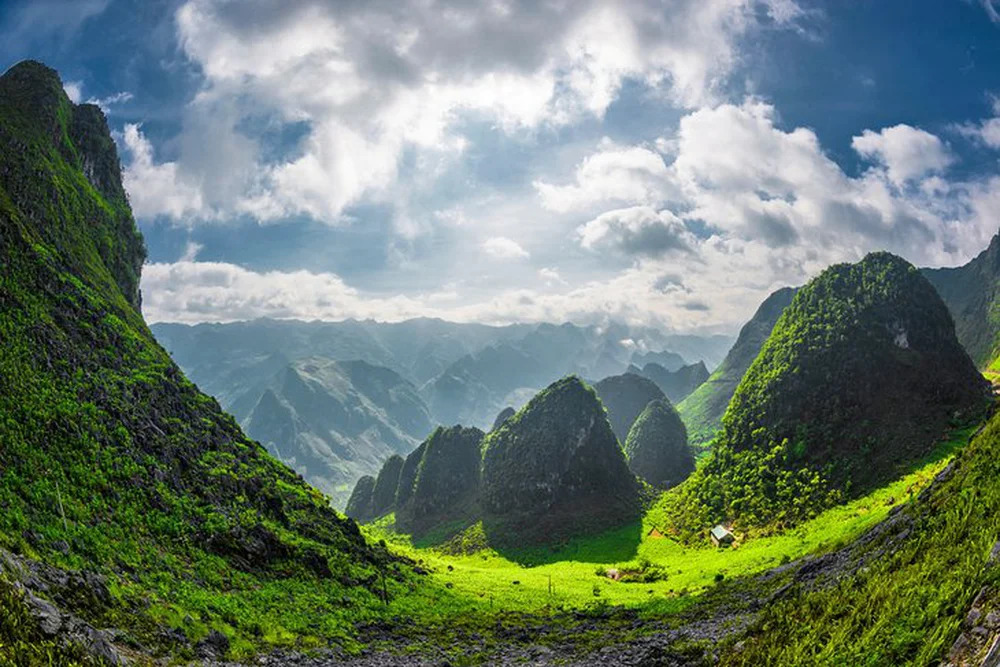
1. Introduction to the Ha Giang Loop
What Is the Ha Giang Loop?
The Ha Giang Loop is a picturesque motorbike trail in northern Vietnam, twisting through the Ha Giang Province. It's renowned for its dramatic karst mountains, rice terraces, and isolated villages inhabited by ethnic minority communities. The loop takes approximately 300-350 kilometers, with a combination of difficult roads and breathtaking scenery. It's not merely about the end point but the ride itself, as each twist and turn offers something new and stunning.
Why It’s a Must-Visit for Adventure Travelers
The Ha Giang Loop is an adventure traveler's dream destination. Its off-the-tourist-map location, pristine landscape, and rich cultural tapestry make it a unique experience. Cycling the loop enables you to witness Vietnam's unspoiled beauty, free from the throngs of more touristy destinations. The sense of freedom you get when you drive along the mountains with the wind running through your hair and endless scenery ahead of you is simply unmatchable. It's a challenge that pushes your physical and mental limits but offers you a reward that can last a lifetime.
Best Time to Visit Ha Giang for an Unforgettable Experience
The best time to visit Ha Giang is during the dry season, from September to November, when the weather is cool and the rice terraces turn golden. Spring (March to May) is also a great time, with blooming flowers and pleasant temperatures. Try to avoid the rainy season (June to August) as the roads can get slippery, and landslides are a possibility. The dry season offers clear skies and comfortable riding conditions, making it the perfect time to explore the loop.
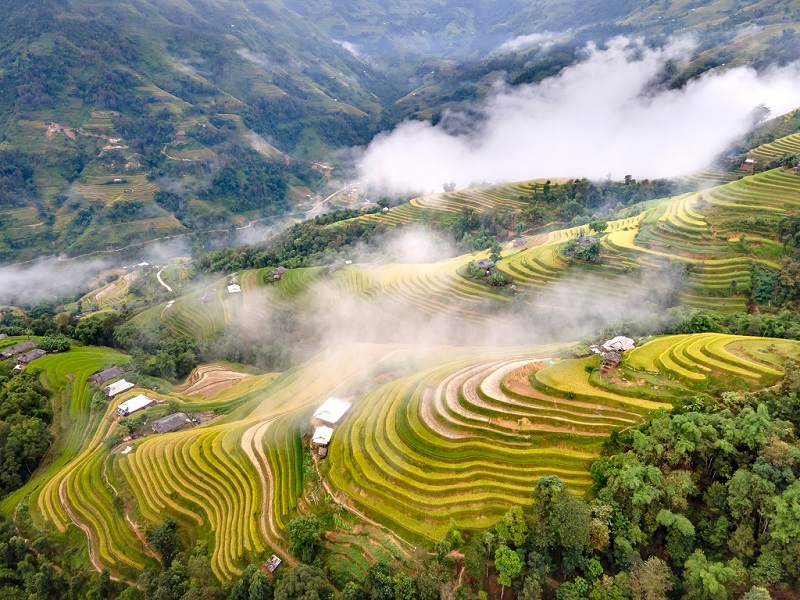
2. How to Get to Ha Giang
Traveling from Hanoi to Ha Giang – Transport Options
The bus ride between Hanoi and Ha Giang takes 6-8 hours. Sleeper buses are the preferred choice, and there are numerous companies offering daily tours. For a smooth ride, there are private cars or motorbike transfers. On a tight budget, the bus is the best option, but if convenience and flexibility are on your mind, then hire a private car or drive your own motorbike from Hanoi.
What You Need to Know About Permits for Foreigners
Foreign tourists need a permit to visit Ha Giang because it's a border zone. Permits can be obtained in Ha Giang City at your hotel or motorbike rental shop. Take your passport and supporting documents. The process is straightforward, and most rental shops or tour operators can do the paperwork for you. Without this permit, you won't be allowed to ride past Ha Giang City, so arranging it in advance is essential.
Where to Rent Motorbikes and Gear for the Loop
Ha Giang City has numerous motorbike rental shops offering semi-automatic and manual bikes. Popular options include Honda XR150s and Yamaha YBR150s. Make sure to rent from reputable shops that provide helmets, repair kits, and maps. It’s also a good idea to inspect the bike thoroughly before setting off, checking the brakes, tires, and lights. If you’re not confident about riding on your own, consider hiring an experienced guide or joining a group tour.
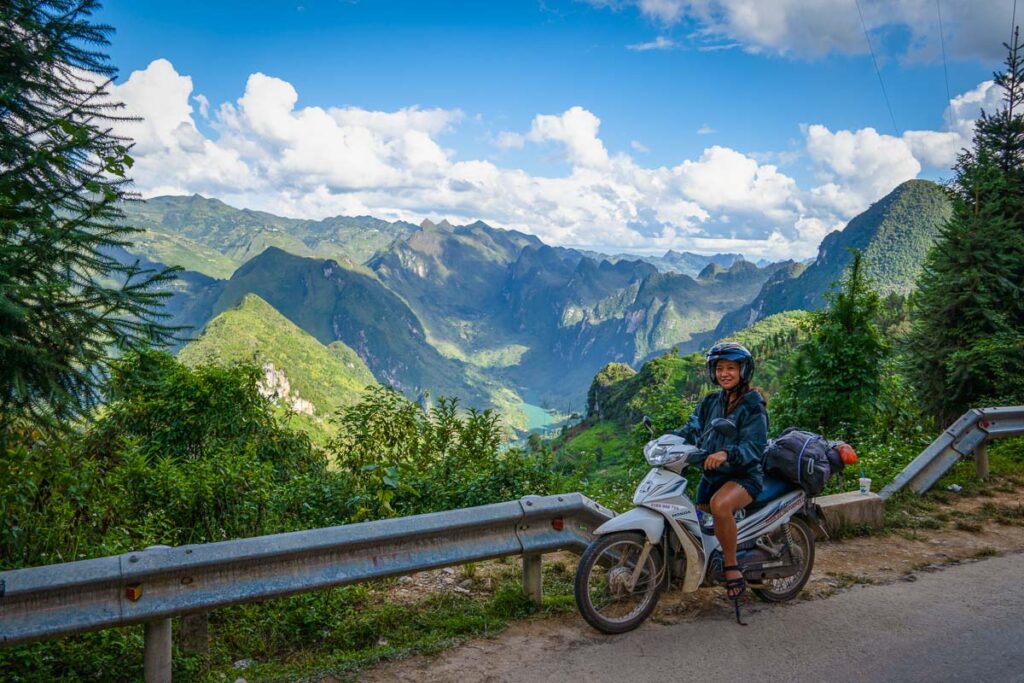
3. Ha Giang Loop Route & Itinerary Options
This is best for short-timers:
- Day 1: Ha Giang City to Yen Minh (100km) – Enjoy the drive through picturesque green valleys and small villages.
- Day 2: Yen Minh to Dong Van (80km) – Explore the Dong Van Karst Plateau and local markets.
- Day 3: Dong Van to Ha Giang City (150km) – Cross the Ma Pi Leng Pass and visit Lung Cu Flag Tower.
Extended 4-5 Day Itinerary for a Less Rushed Experience
For a deeper exploration, add stops like Du Gia Village and Meo Vac. There is more time to enjoy the views and interact with the locals. A 4-5 day itinerary would be something like this:
- Day 1: Ha Giang City to Quản Bạ (70km) – Trek to the Twin Mountains and stay overnight in a homestay.
- Day 2: Quản Ba to Yen Minh (50km) – Stop at the Quản Ba Pass and enjoy the peacefulness of the countryside.
- Day 3: Yen Minh to Dong Van (80km) – Stop by the Dong Van Old Quarter and the Palace of the King of the Hmong.
- Day 4: Dong Van to Meo Vac (30km) – Ma Pi Leng Pass bike and boat tour along the Nho Que River.
- Day 5: Meo Vac to Ha Giang City (150km) – Explore Du Gia Village and its beautiful waterfalls, then back to Ha Giang City.
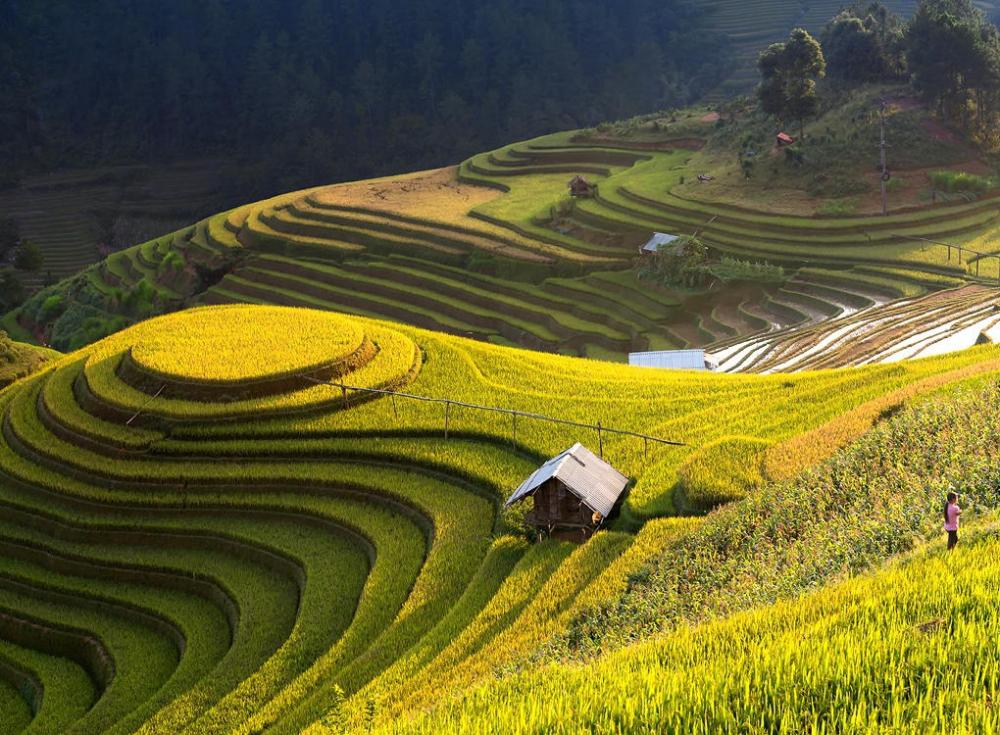
Must-See Stops Along the Ha Giang Loop
- Dong Van Karst Plateau: A UNESCO Global Geopark with spectacular rock formations and unique geological characteristics.
- Ma Pi Leng Pass: The "King of Passes," offering stunning scenery of the Nho Que River and nearby mountains.
- Lung Cu Flag Tower: The northernmost tip of Vietnam, symbol of national pride and with panoramic views over the border area.
- Du Gia Village: A peaceful village with waterfalls and greenery on either side, perfect for a relaxing halt.
4. Essential Tips for Riding the Ha Giang Loop
Safety Tips for Motorbike Riders
- Always wear a helmet and protective gear.
- Ride cautiously, especially on sharp turns and steep descents.
- Avoid riding at night due to poor road conditions and limited visibility.
- Take regular breaks to rest and hydrate, as the ride can be physically demanding.
- If you’re a beginner, consider practicing on easier routes before tackling the loop.
What to Pack for Your Ha Giang Adventure
- Warm clothing for chilly mountain nights.
- Rain gear and waterproof bags to protect your belongings.
- Basic repair tools, spare parts, and a first-aid kit.
- Snacks and water to keep you energized during the ride.
- A good camera or smartphone to capture the stunning scenery.
Fuel Stops, Food, and Accommodation on the Route
Fuel stations are sparse, so fill up whenever possible. Local eateries serve hearty Vietnamese dishes like pho and com lam (bamboo rice). Accommodation ranges from basic homestays to guesthouses, with prices starting at $10 per night. Staying in homestays is a great way to experience local hospitality and learn about the culture.
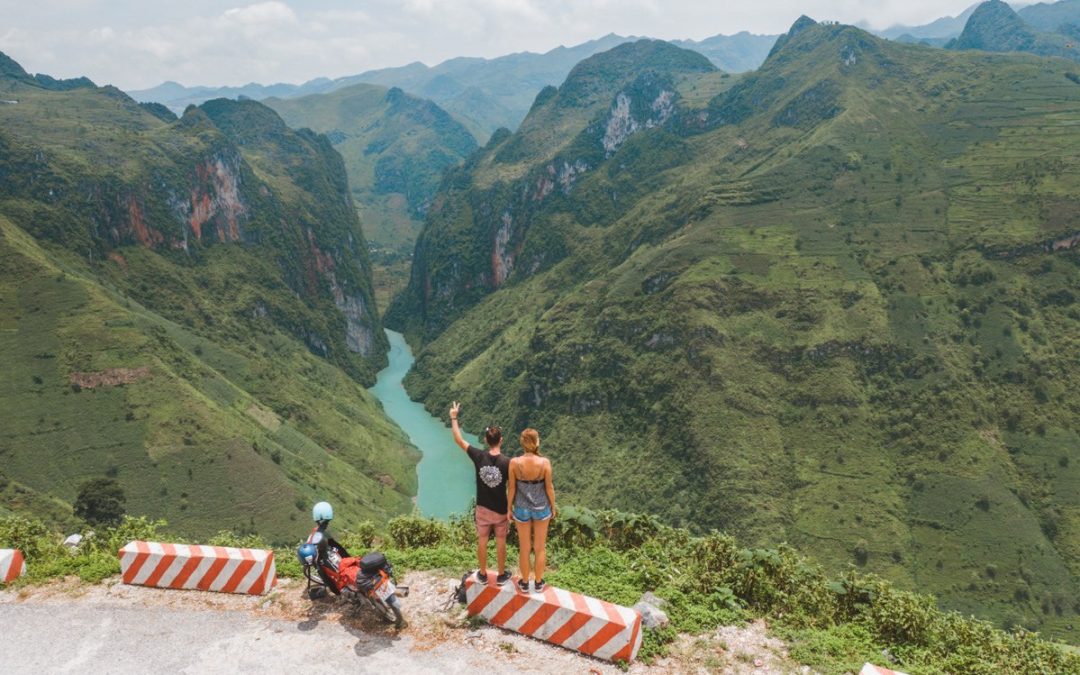
5. Experiencing Local Culture Along the Loop
Meeting Ethnic Minority Communities
The Ha Giang Loop is home to Hmong, Tay, and Dao communities. Respect local customs, ask for permission before taking photos, and consider purchasing handmade crafts to support their livelihoods. Many villages welcome visitors and offer insights into their traditional way of life.
Best Local Dishes to Try in Ha Giang
- Thang Co: A traditional Hmong horse meat stew, often served with herbs and vegetables.
- Men Men: Steamed cornmeal, often served with vegetables or meat.
- Au Tau Porridge: A warming dish made from a local root, known for its medicinal properties.
- Bamboo-Tube Rice (Com Lam): Sticky rice cooked in bamboo tubes, often served with grilled meat.
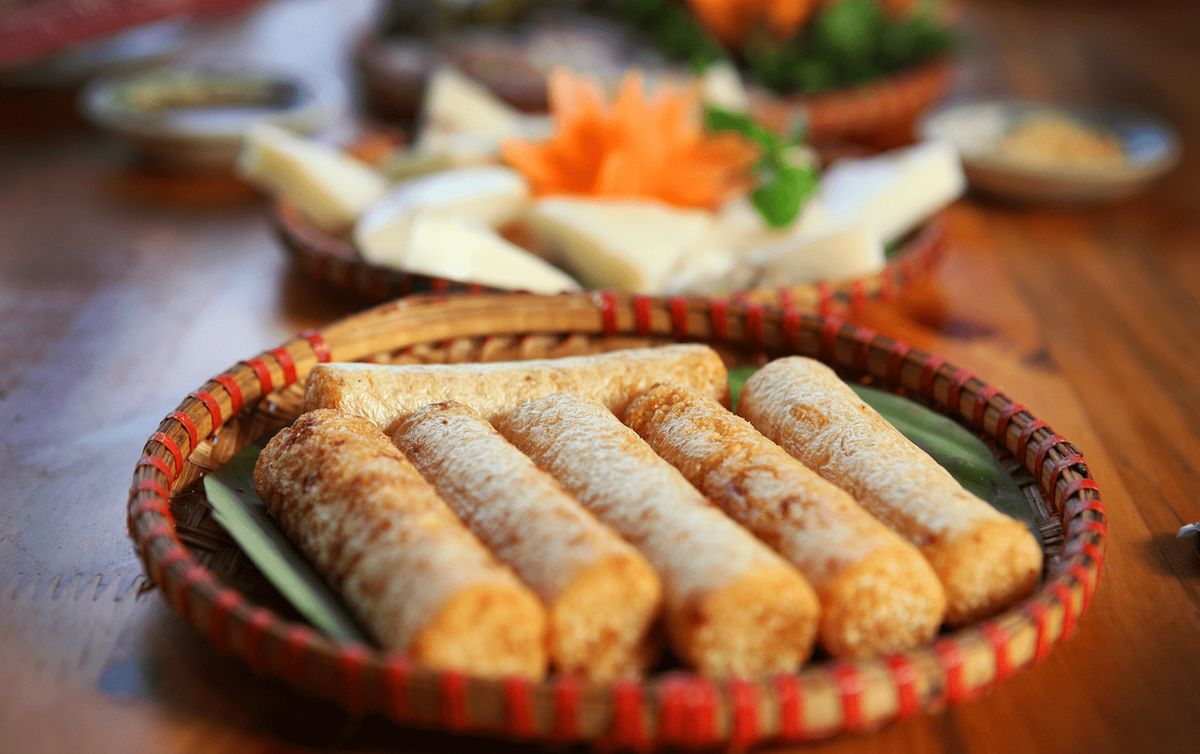
Homestays vs. Hotels – Where to Stay on the Loop
Homestays offer a unique cultural experience, allowing you to stay with local families and learn about their daily lives. Hotels in towns like Dong Van and Meo Vac provide more comfort but lack the authentic charm of homestays. Whichever option you choose, book in advance during peak seasons to secure your stay.
6. Common Mistakes to Avoid on the Ha Giang Loop
Overestimating Riding Skills – Know Your Limits
The loop’s roads are challenging, with steep climbs and sharp turns. If you’re a beginner, consider hiring an experienced rider or joining a guided tour to Vietnam. Overconfidence can lead to accidents, so always ride within your limits.
Not Packing Proper Rain and Cold Weather Gear
Weather in the mountains can change rapidly. Pack layers, waterproof clothing, and sturdy shoes to stay comfortable. Even in the dry season, sudden rain showers are common, so be prepared.
Ignoring Local Customs and Driving Regulations
Respect local traditions and follow traffic rules. Drive on the right side of the road and avoid speeding. Being mindful of local customs and regulations ensures a smooth and enjoyable journey.
Conclusion – Why the Ha Giang Loop Should Be on Your Vietnam Bucket List
The Ha Giang Loop is more than just a motorbike ride; it’s an immersive journey into Vietnam’s natural beauty and cultural heritage. From the jaw-dropping landscapes to the warmth of the local people, this adventure promises memories that will last a lifetime. Whether you’re seeking adventure, cultural experiences, or simply a break from the ordinary, the Ha Giang Loop has something for everyone.
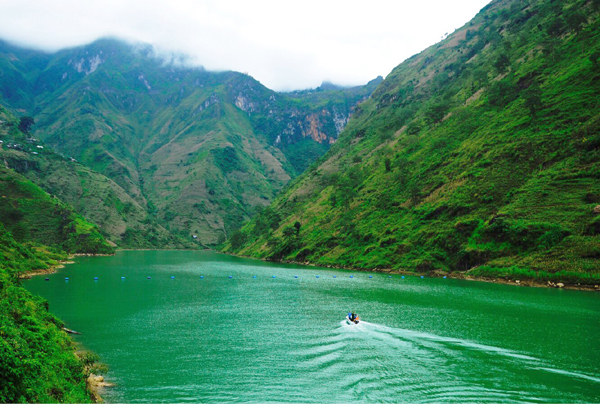
Final Travel Tips for an Amazing Ha Giang Adventure
- Plan your trip during the dry season for the best experience.
- Book accommodations in advance, especially during peak seasons.
- Travel with a reliable motorbike and always prioritize safety.
- Take your time to soak in the views and enjoy the journey.
How to Make the Most of Your Journey
Take your time to discover, talk to people, as well as welcome the thrill of exploration. The Ha Giang Loop is not simply a destination, but it’s an experience. That experience will leave you in awe of Vietnam’s treasures. With careful planning, accompanied by an open mind, your Ha Giang adventure will be nothing short of extraordinary.










